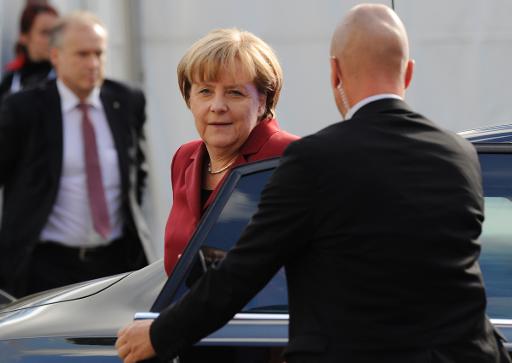Time magazine Wednesday named German Chancellor Angela Merkel as its "Person of the Year 2015," hailing her leadership for navigating debt and refugee crises that threatened to tear the European Union apart.
"For asking more of her country than most politicians would dare, for standing firm against tyranny as well as expedience and for providing steadfast moral leadership in a world where it is in short supply, Angela Merkel is Time's Person of the Year," wrote editor Nancy Gibbs.
Time described her as de facto leader of the European Union who this year steered the union through two existential crises -- Greek bankruptcy and the migrant crisis.
Throughout the eurozone crisis, when a battered continent looked to Berlin, Merkel preached fiscal discipline and kept a tight grip on the nation's purse strings, soothing the angst of a thrifty populace.
But it was this summer that the usually cautious leader took the biggest gamble of her decade in power by throwing open Germany's doors to asylum seekers -- owning an issue set to define her legacy.
One million asylum seekers are expected in the country by the end of December as conflicts rage in Syria, the Middle East and Afghanistan.
On Wednesday, Merkel's spokesman Steffen Seibert, warmly welcomed the accolade, announced by Time on American breakfast television.
"I am sure that the chancellor will see it as an encouragement to press on with her political work for the good of Germany as well as Europe," he said.
A Lutheran pastor's daughter who grew up behind the Iron Curtain, the 61-year-old Merkel is the world's most powerful woman, first elected chancellor in 2005 by Europe's biggest economy.
- Not the easy road -
She has been praised by refugees as "Mama Merkel" and derided as the eurozone's "austerity priestess" but her stunning ascent from communist East Germany defies political convention.
"The prospect of Greek bankruptcy threatened the very existence of the euro zone. The migrant and refugee crisis challenged the principle of open borders. And finally, the carnage in Paris revived the reflex to slam doors, build walls and trust no one," Gibbs wrote Wednesday.
"Each time Merkel stepped in. Germany would bail Greece out, on her strict terms. It would welcome refugees as casualties of radical Islamist savagery, not carriers of it.
"And it would deploy troops abroad in the fight against ISIS... You can agree with her or not, but she is not taking the easy road. Leaders are tested only when people don't want to follow."
Seemingly indifferent to the trappings of power and lacking vanity, Merkel lives in a Berlin flat with her rarely seen scientist husband Joachim Sauer.
She shops in a neighborhood supermarket and spends holidays hiking in the Alps.
Her oratory is often monotonous and she is awkward in front of the cameras, but it is this air of ordinariness that has made Merkel a hit with German voters, who value no-nonsense pragmatism and competence.
A star student at school, she excelled in Russian, which she has put to use in defusing the Ukraine conflict with President Vladimir Putin, who was a KGB officer in East Germany when the Wall fell in 1989.
Abu Bakr al-Baghdadi, leader of the Islamic State extremist group, Republican presidential candidate Donald Trump, America's Black Lives Matter activists campaigning against inequality and Iranian President Hassan Rouhani were named by Time as runners up.






















































